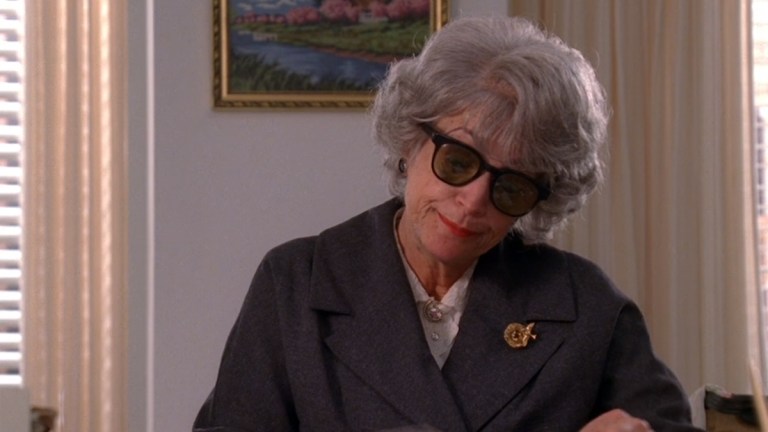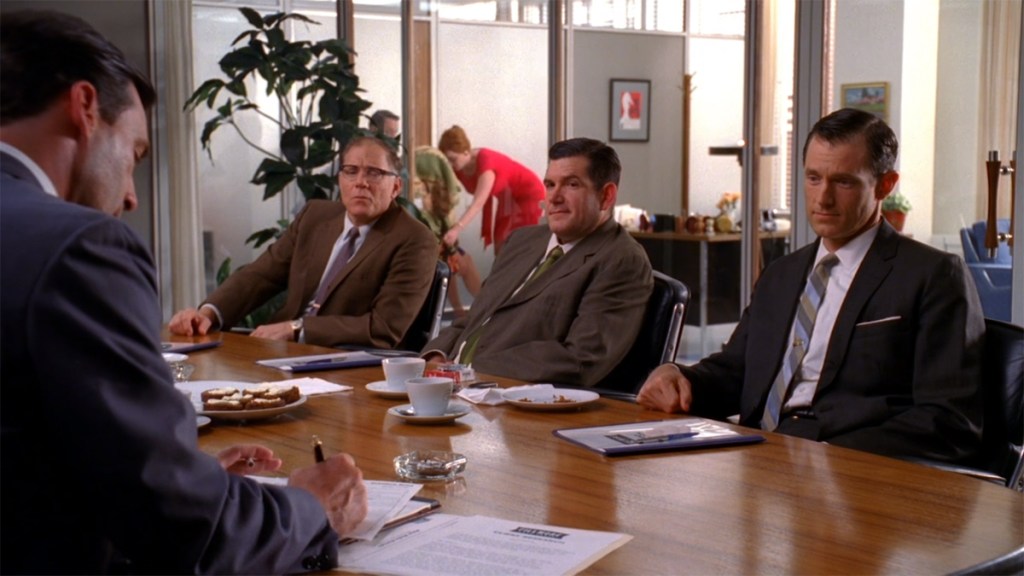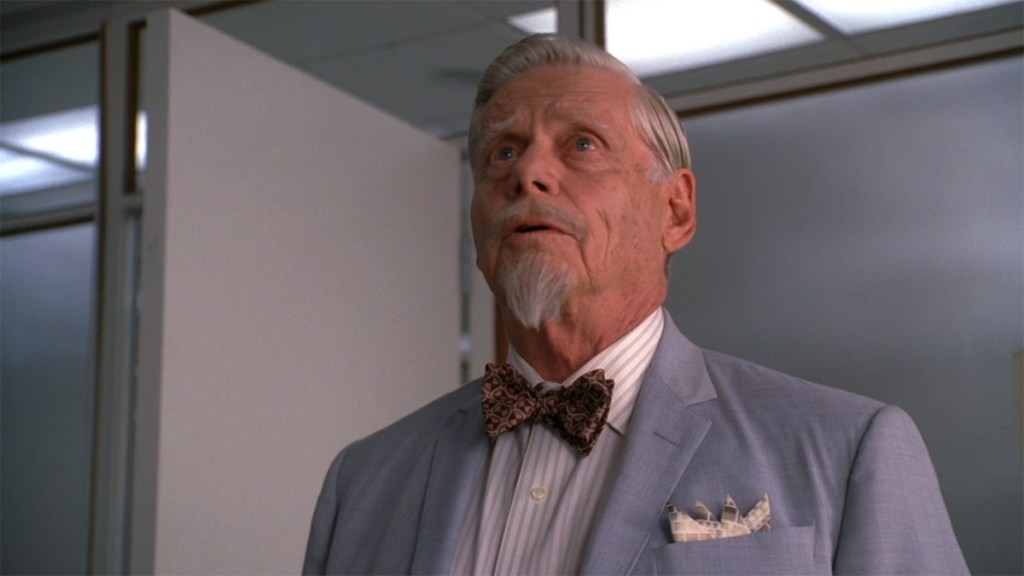Argue All You Like, But This Is Mad Men’s Greatest Line
Not “It will shock you how much it never happened,” not “This is where I grew up.” This is the best line from seven seasons of AMC’s Mad Men.

Warning: contains spoilers for Mad Men season four.
Everything about Ida Blankenship is a punchline. From the spilt Scrabble tiles clatter of her name, to her gravelly voice and chewed-on Brooklyn vowels, to the old lady wig and post-cataract lenses used to age up and disguise the glamour of actor Randee Heller, the Mad Men character exists purely as a gag. A relatively rare one, in a show mostly fixated on existential emptiness.
The point of Miss Blankenship when she finally appears as comic relief in season four is that she’s not sexually desirable. Ad company office manager Joan billets her at Don Draper’s desk after he’s used up and discarded another in a long line of nubile young secretaries. The braying old woman’s a failsafe; she’s the bromide in Don’s coffee.
Miss Blankenship’s lack of allure is exactly what makes her reputation as a “Queen of Perversions” hellcat who showed a young Roger Sterling the ways of the world back in the day even funnier. That old lady? Sheesh.
Even in death, Miss Blankenship provides one of Mad Men’s funniest moments. When she expires unexpectedly at her desk in season four episode nine “The Beautiful Girls”, her exit leads to some some grade A clowning. Still upright on her wheelie chair, her corpse draped in a blanket that leaves her legs comically exposed, she’s wheeled across the back of shot in a silent farce. Don and co.’s eyes widen as they attempt to keep their meeting on track while, behind their clients’ heads, Pete and Joan push Miss Blankenship to a better place.

It’s only afterwards, when Ida’s being borne away in more dignified style on a medical gurney, that Mad Men once again justifies its title as Best Written TV Show of All Time. (Yes, we can fight about it, but to warn you, I’ll win.) Bert Cooper, the only member of the Sterling Cooper Draper Pryce team to have made the journey around the sun more times than his ex-secretary, stubs out the fun with feelings. Actor Robert Morse beautifully deflates Cooper with grief and everybody sobers up – figuratively, of course, this is still Mad Men.
Later, tasked with writing Miss Blankenship’s obituary, inveterate ad man Cooper is frustrated that he can’t come up with the right slogan to send her on her way. Pacing around Roger Sterling’s office, he berates himself for a lack of ideas. Roger of course knows exactly what to do – call Joan, who calmly and effectively starts drafting copy. The obit fills out with kind but bland platitudes: loyal friend, devoted caretaker, quietly in her sleep… “What’s her profession? Secretary?” asks Roger. “Executive Secretary,” corrects Joan, conferring a little more dignity on the dead woman.
Bert Cooper speaks, and then walks out of the room: “She was born in 1898 in a barn. She died on the 37th floor of a skyscraper. She’s an astronaut.”

It’s one hell of a line. And it describes one hell of a journey, not just from the dirt to the sky, from the past to the future, but from punchline to… innovator, conqueror, hero – words not commonly used to describe lowly female secretaries in their sixties.
The line equates the achievements of Miss Blankenship – a kind of Roz from Monsters Inc. in human form – with the achievements of the twentieth century. According to Cooper’s tagline, Ida didn’t just live her life, she flew it from star to star. (Two years before Miss Blankenship’s death, Russian Valentina Tereshkova had been the first female cosmonaut to travel in space. If not for her, then Bert’s eulogy might have been more banal.)
Cooper’s words are the perfect image for Mad Men, a show about self-invention and transformation that started out as the story of how dirt-poor Dick Whitman stole an identity and rebuilt himself to became millionaire Don Draper.
It’s also the perfect image for Mad Men because it’s so damn slick. Burt’s line elevates and burnishes Ida like she was any other product SCDP had been hired to sell – another Sugarberry Ham, say, or London Fog raincoat. In life, Miss Blankenship was a laughing matter, but with this stamped across her body bag, she becomes an inspirational must-have item. (In 2010, the words “She’s an astronaut” will have been tattooed in tasteful italics on the pale inner arms of multiple postgrad students, guaranteed.)
Matthew Weiner’s episode co-writer Davhi Waller – creator of the excellent Mrs. America – also cleverly folded Bert’s glorious line into an episode about women being defined by men. Elsewhere in “The Beautiful Girls”, directed by Michael Uppendahl, office manager Joan, copywriter Peggy, brand psychologist Dr Faye and even Don’s daughter little Sally all serve and shape themselves around the men in their lives. The episode culminates in a superheroes-assemble-style elevator shot preceded by Peggy’s lesbian friend Joyce making a speech about men being soup and women being the pot (“and who,” says Joyce with entirely good sense, “wants to be a pot?”).
All of which makes it ironically fitting that the final word on Ida Blankenship, the summation of her life and stamp of approval, comes courtesy of her male boss – and former paramour, as the rumours go. Never mind that she outsmarted him earlier in the episode when the two of them were filling in the newspaper crossword from opposite ends of the room. (Bert to Ida “A three letter word for a flightless bird” / “Emu” / “Nope. It starts with an L” / “Like hell it does.” Randee Heller is so funny with so little material, she should have won the Emmy for which she was nominated in this role.)
The astronaut line then, is a killer. It’s a dizzying celebration that makes your heart soar to hear it, while being packed with irony and an extremely on-brand sense of hollowness. It epitomises Mad Men’s project of turning history into modernity while summing up its later exploration of the 20th century strictures on women. It’s a TARDIS of a line – so much bigger on the inside. Good luck getting an AI to come anywhere close.
